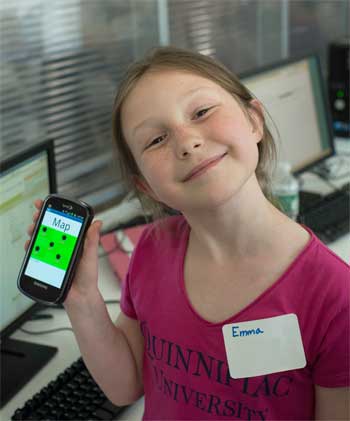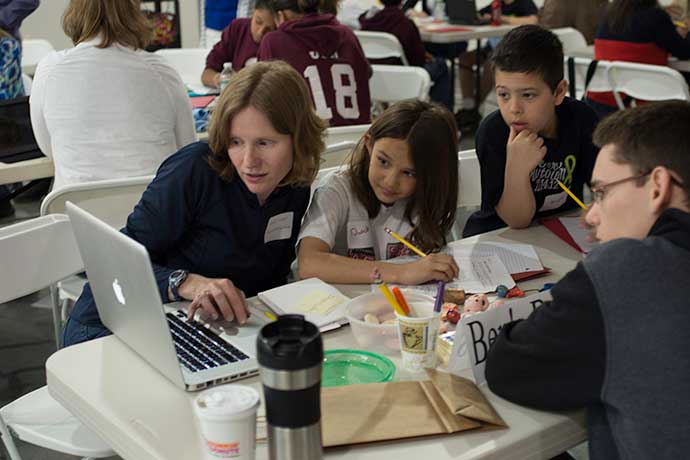Around May 1 this year, when I started to publish this magazine, I traded a few emails with Patrice Gans, a computer science teacher, asking her if she could connect me to teachers who teach computer science K-6. She promptly invited me to an event a few days later called Random Hacks of Kindness, Junior. It would be a day of kids coding, and learning how to code, to help a few local non-profit groups.
While the drive was three hours plus round trip, I was curious how it might all play out. The event seemed wonderfully quixotic: there’s not a lot you can code completely in a day or, for that matter, a week or two. So I drove up early on a Saturday morning and spent most of the day. Unfortunately, I had to leave a couple hours before the end for family stuff on Long Island.
What I did see left me amazed, on many levels. The kids were both bouncy and extremely focussed. College students served as mentors and they clearly loved helping the kids figure out how to design an application then answer questions about how to code AppInventor. The stakeholders, all of them non-profits, engaged the kids as equals, answering all their questions and holding nothing back.
I’ve been in many requirements meetings for software development and, age differences aside, the back and forth discussing needs, options, tradeoffs, and making decisions played out exactly the same way. None of the kids stopped the conversation to debate the merits of My Little Pony or whatever toys and games they currently play. Voices were a little higher pitched, the enthusiasm and energy level barely constrained.
Patrice, the parents, the stakeholders, and all the adults engaged the students as equals, working with them to define then solve problems as well as have fun.
The event started with a presentation about Random Hacks of Kindness, the “adult” version of the event. But both events had the same purpose, “to create a self-sustaining global community of innovators building practical open technology for a better world, and to ensure their work creates impact in society.” The work of RHoK for disaster relief organizations is amazing. They have created technology, for example, to harness data about refugees to find people and help them get the assistance they need in often chaotic refugee camps.
Next each of the non-profits at the event described what they do. Kids then were divided into groups based on their interests. Those interested in polar bears, for example, worked with the Polar Bear non-profit. Parents and mentors also were assigned, with parents working apart from their kids. Within the small groups, each stakeholder talked with the kids about their non-profit, how they worked, what needs they had, how technology might help, and many other questions. The kids used the answers to design an application to solve specific problems. Mentors helped only as needed, to answer a question or gently guide the conversation. Once they had a design, the kids created their applications.
While I’m a Luddite by nature, skeptical of the chronic need for technology and wary of its negative effects, the Random Hacks of Kindness, Junior event showed me coding almost was beside the point. You could not design and develop the perfect application in a day. But you could expose the kids to the design process to create any technology. You could expose the kids, mentors, stakeholders, parents, and other adults to the communal back and forth brought about by shared projects.
In short, you could teach everyone about the essential nature of human life. We need each other. We can enjoy each other while working on projects to benefit people, whether us or someone else. And the process we use to identify problems, design solutions, and then build solutions is mostly the same regardless of technology. We could have been debating whether or not to grow corn or squash, or the best place to put a windmill or a well.
In their own words, here is what people thought of the event:
“I really enjoyed this opportunity to work with really bright young ones! They all enjoyed themselves and kept the creativity flowing. Their ideas were practical and realistic.” Matt Stanko, mentor, Ben’s Bells.
“My experience here today was wonderful. All of the kids were really into their projects and it was exciting to see their amazement at some of the projects. This was a wonderful experience for me and I would love to come back for similar events.” Richard Reilly, college mentor.
“Awesome event! The kids had really good ideas and offered a great perspective. Eye-opening for my own child to learn to connect technology with humanitarian efforts. The mentors were fabulous!” a Parent
“Thought this was an extraordinarily successful day! I was really impresssed with the level of engagement and focus shown by my team.” Beth Krueger, stakeholder, Ben’s Bells Newtown
“I liked that we got to create apps and get a chance to help the community.” Christopher, age 10
“Great experience! Provided teamwork for all of us! It made us work super hard! Really fun!!” Isabell, age 11
“Today was a lot of fun. My favorite part about today was when we developed the app. I also enjoyed thinking about the different pages. Today was fun!” Harel, age 10
As I drove back to Long Island from Connecticut, it struck me this event was the perfect start for my magazine about coding and computer science. I could be anatomical, documenting everything from A to Z. However, I’d miss almost all of the fun stuff.
People do great things with computers and software programming, and most don’t work for Google or Facebook or Instagram. For many, computing is not a lottery. There are scientists, for example, who use programming to stop deadly viruses in hospitals, or study owls without having to disturb them and their habitat. The current US Poet Laureate for Children also is a programmer. And computer science includes problem solving which is always fun, if frustrating at times.
And most of all, like any technology and tool, computers have a social aspect. They can do good or bad. They reflect our best and worst needs and interests. If I could capture some of the energy and engagement and fun of the Random Hacks of Kindness, Junior event in my magazine, it would be perfect, for me at least. I had a lot of fun and was happy to have answered ‘yes’ to Patrice’s invitation to join her event and see everyone work together.
Here is my favorite picture from the day spent hacking:

If you’re interested to host a Random Hacks of Kindness, Junior event at your school, Patrice suggests contacting Thea Aldrich, from Random Hacks of Kindness, at .

